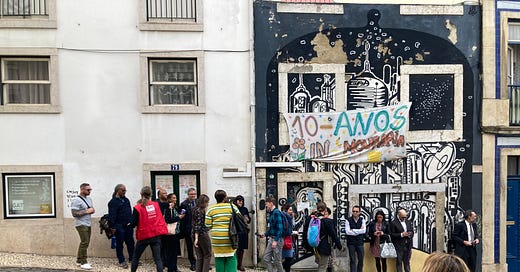DID I MENTION that I finished my book on authoritarianism? I was lying.
I turned in my book, which is completely different from finishing it. It is still an important milestone. I still feel thrilled. But ten days after turning it over to my agent, I received a 4-part memo about the fixes it needs. Back to work.
A QUICK UPDATE ON PORTUGAL. I returned from following a delegation of Oregon officials, and am working up my own article on how we can benefit from drug policy there. But in the meantime, the Oregonian did a good overview of the same trip, link below.
The Oregon delegation included drug reform advocates and homeless service providers in favor of decriminalization, but also police officers and elected officials critical of it. The meetings were disputatious—sometimes more lectures aimed at each other than questions for the Portuguese. A leader of the Lisbon Dissuasion Commission told me later, “They need a therapy session.” He noted tha some wanted more, others less decriminalization. Until we choose a course, there is little point discussing implementation.
The real problem is philosophical. There is still a routine belief in America that drug addiction is a moral failure, to be cured with criminal means: punishment, arrests, jail time, and sweeps of homeless encampments. “My constituents are yelling at me” to send in the police, one politician said. But addiction is in fact a chronic disease, rarely cured, and needing an ongoing medical response.
On the other side, there is still a routine belief that the problem is “homelessness,” or an economic failure, to be cured with compassion. Many of the reform advocates talked about “the homeless,” but not about drugs. I was instructed to stop saying “addicts,” and refer to “people who are addicted,” although another person corrected even that, suggesting “people who use drugs.” These are euphemisms which are meant to humanize the (sorry!) addicts. Certainly, dehumanizing them is wrong, and Portugal has succeeded largely by treating them with dignity and agency.
But the Portuguese have no problem saying it straight up: the problem is drug addiction. A health official told me that fixing the language we use to describe addicts was 16th on his list of priorities, behind every other facet of treating people. The Portuguese never refer to “homelessness,” and housing plays very little role in their response to addiction (I interviewed the country’s top drug czar; he mentioned housing once, 35 minutes into a 37 minute interview.)
Until we center drug treatment, housing is little help. I am aware that many experts disagree, and now advocate a “housing first” response. I’ll continue researching this, but Portland, where cheap rentals are widely available and rents are falling, refutes the idea that the main problem is putting a roof over their heads.
On a personal note, my trip to Portugal sucked: difficult and often failed reporting in Lisbon, and my 4-day motorcycle trip around the north was rudely cancelled by an Atlantic storm cycle packing 40-mph winds and torrential rains. I was forced to eat a lot of great meals in Porto.
More book news and journalism updates to come after the Thanksgiving break. Here is the Oregonian article, and a link to another good piece on why “safe spaces” for drug consumption work. Drug Spaces





Huzzah on semi-finishing book; deep condolences re forced feeding in Porto.
Where do you see " cheap rents widely available?" I don't see that here in Portland.
Read the Oregonian article and was going to ask you what you thought of it. Glad to know it was decent reporting.